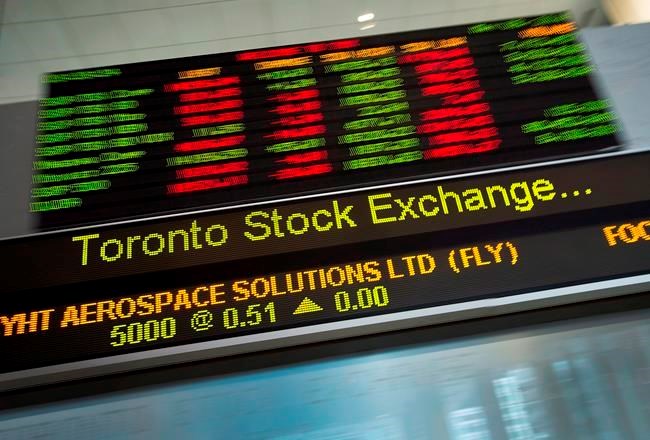TORONTO — Canada's main stock index sank to a more than three-month low midweek as global spike in COVID-19 infections raised fears of new lockdowns.
Lockdown measures in France and Germany hit European equities and the rising infection numbers in North America had people wondering if the same result will take place here in another few weeks, said Greg Taylor, chief investment officer of Purpose Investments.
"I think that just caused more people to say it's time to take some money off the table and just down risk," he said in an interview.
Taylor said headlines out of Europe attracted everyone's attention and caught some people off guard.
North American stock markets saw low trading volumes ahead of next week's U.S. election, as investors didn't want to take any bets.
Polls indicating a narrowing of former vice-president Joe Biden's lead over President Donald Trump also raised concerns about a contested election and supported the emergence of this pre-election correction, he said.
The market had been getting comfortable with the idea of a so-called blue sweep by Democrats that would result in a massive stimulus program, Taylor said. But recent polls suggesting the race may be closer raise doubts about that result.
The S&P/TSX composite index closed down 434.37 points or 2.7 per cent to 15,586.57, the lowest closing since July 9.
The decrease came amid a broad-based decline spurred by a tumble of commodity prices.
All 11 major sectors on the TSX ended down, led by materials, energy technology and financials.
The selloff was led by over-owned areas of the market that enjoyed stronger performances, said Taylor.
"It's more of a selling winners ... more than anything else."
In New York, the Dow Jones industrial average was down 943.24 points to 26,519.95. The S&P 500 index was down 119.64 points at 3,271.04, while the Nasdaq composite was down 426.48 points or 3.7 per cent at 11,004.87.
Materials lost 4.5 per cent with shares of Silvercorp Metals Inc. and Kinross Gold Corp. down 11.1 and 9.5 per cent respectively on lower gold prices prompted by a strengthened U.S. dollar.
The Canadian dollar traded for 75.18 cents US compared with 75.96 cents US on Tuesday.
The December gold contract was down US$32.70 at US$1,879.20 an ounce and the December copper contract was down nearly three cents at US$3.06 a pound.
Investors seeking to raise cash could sell gold, which has performed very well this year.
Energy dropped 3.9 per cent as crude prices fell to the lowest level in nearly a month. That hurt several oil producers, including Vermilion Energy Inc., Husky Energy Inc. and Whitecap Resources Inc., whose shares fell 8.3, 6.3 and six per cent respectively.
The December crude oil contract was down US$2.18 at US$37.39 per barrel and the December natural gas contract was down two cents at US$3.29 per mmBTU.
The lockdowns in Europe, reminiscent of similar moves in March and April, raised concerns about slowing oil demand.
In addition, U.S. weekly inventory levels showed that crude stockpiles increased more than expected at 4.3 million barrels. Production surged to 11.1 million barrels per day, its highest level since July.
Technology lost 3.4 per cent with Lightspeed POS Inc. off 8.5 per cent and Celestica Inc. down 8.2 per cent. Financials decreased 2.3 per cent.
In a sign of investor nervousness, the Volatility Index (VIX), known as Wall Street’s “fear index,” surged to its highest level since June 15.
Taylor expects markets will remain volatile until the outcome of the election becomes clear.
"I don't think we're going to see dramatic drops like this carrying on," he said.
"We're in a much better position than we were in February and March but I think the volatility is not going to go away any time soon until we get an outcome of the election, that's really what we what we need to see."
This report by The Canadian Press was first published Oct. 28, 2020.
Companies in this story: (TSX:SVM, TSX:VET, TSX:HSE, TSX:WCP, TSX:LSPD, TSX:CLS, TSX:K, TSX:GSPTSE, TSX:CADUSD=X)
Ross Marowits, The Canadian Press




